 With Federal Parliament resuming today, events have been unfolding from protests over hearings of TransCanada’s long-standing Energy East plans. The pipeline is so strongly now in the public eye that it has garnered attention from past and present Prime Ministers. Brian Mulroney for example, defends the projects’ potential to be a nation-building endeavour of NAFTA proportions, while the current Prime Minister Justin Trudeau seeks to strengthen environmental standards and build confidence in new regulatory rules.
With Federal Parliament resuming today, events have been unfolding from protests over hearings of TransCanada’s long-standing Energy East plans. The pipeline is so strongly now in the public eye that it has garnered attention from past and present Prime Ministers. Brian Mulroney for example, defends the projects’ potential to be a nation-building endeavour of NAFTA proportions, while the current Prime Minister Justin Trudeau seeks to strengthen environmental standards and build confidence in new regulatory rules.
While Mulroney preaches to university law students, and Trudeau muses over the hemorrhaging of billions of lost economic growth, a politician of lesser standing only in title matched the two with an impassioned and logically tempered thesis as to why Energy-East needs approval, not only for Western Canadians, but for Canada itself. Above all, Saskatchewan Premier Brad Wall highlights the need to reach new markets with crude oil. Such a move would generate a competitive advantage for Canadians engaged in its production. Secondly, Energy East is an issue of national unity as commodity transportation lies at the very heart of confederation itself.
The inability to get product to new markets costs our economy invisibly and heavily. As Kevin O’Leary stated, Canadian oil sells at a 20-25% discount to world prices. The bulk of our export capacity is into the United-States, which is resting on historic highs of producing 3.5 million barrels per day (about 1/3 of what Energy east could transport). Since all this crude is going to so few markets, it is subject to the regional fluctuations of a small piece of the global market. Aside from subjecting our economy to unnecessary price volatility, the U.S interior and to a lesser extent its neighbors, are themselves in a supply glut.
Canada is selling oil to a nation drowning in it and we can’t do anything about it. The end result is that we end up selling at discount prices relative to the global average.
If deep-water export capacity were to be achieved, Canadian producers would have a greater control over the price they choose to accept for their product (they would be able to contract pipeline capacity going in the U.S., or to a variety of other regional, oversees markets). When the only body stopping the construction of the pipeline is Canadian governance, it is only diligent to consider the risks of the perceptions of national unity.
Commodity transportation across Canada is at the very heart of confederation. The deliberation of the Trans-Canadian railroad, burdened by our first Prime Minister, fulfilled British Columbia’s requirement to joining the Dominion, and joined the West with the East. One could argue an economic consensus, championed by Canada’s dominant theory of economic growth, the staples theory, was formed upon entry to confederation, supporting a narrative that national prosperity would be achieved through a resource rich West supplying a capital rich east.
As the Trans-Canadian railroad paved the way for the Trans-Canada highway, and then eventually oil and gas pipelines, it’s now time for Canada to transport the world’s most important commodity at a scale and safety standard fit for the early 21st century. When looking back through history it is easy to see how Mulroney sees Energy East as the next great Canadian political undertaking.
Saskatchewan Primer Brad Wall, in my critical reflections of his rhetoric and proposed policy, continues to offer a voice of sobriety and reason in an age where political perceptions are easier to manifest by abandoning such virtue. The Canadian oil and gas industry, through its inability to trade on world markets, is taking a 20-25% hit on revenues. These are taxable revenues for governments mired in deficit spending. Yes, pipelines such as TransCanada’s Energy East is an issue of national unity. The bedrock of West-East relations runs on the preclusion of a connected and integrated market, the building of the national railroad is a testament to that. A federal government declining to link East and West with oil, the world’s most important commodity, flies directly against the vision of the man on our ten-dollar note. This was a man whose vision and dedication to making choices specifically because they were hard created a nation traversing the continent.